OP Sequence
 |
 |
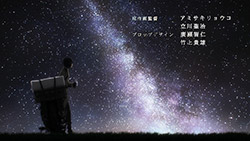 |
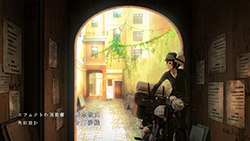 |
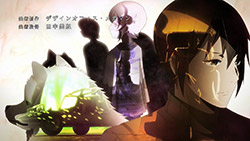 |
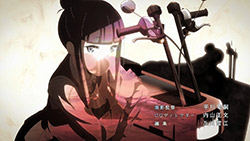 |
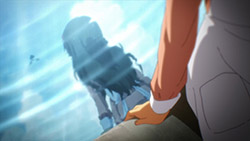 |
 |
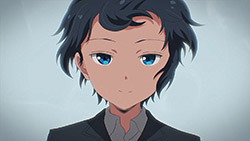 |
OP: 「Here and There」 by Yanagi Nagi
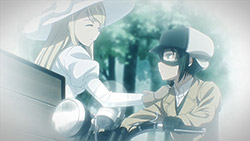 |
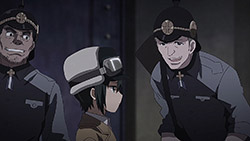 |
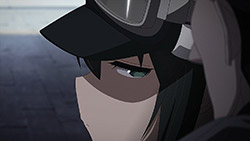 |
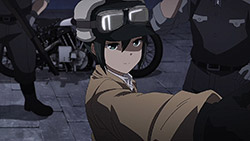 |
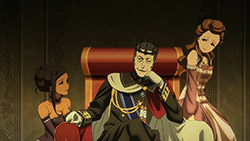 |
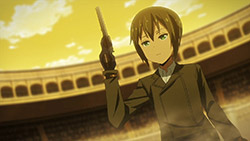 |
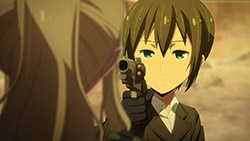 |
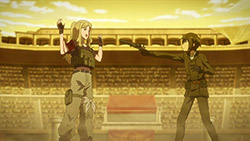 |
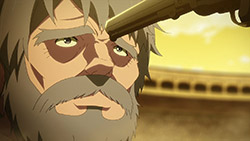 |
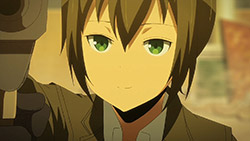 |
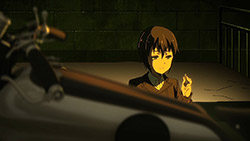 |
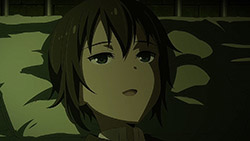 |
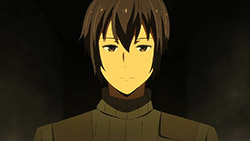 |
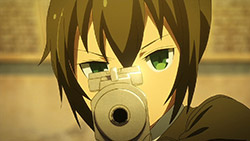 |
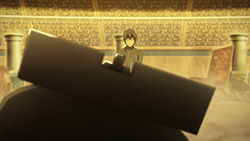 |
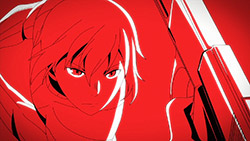 |
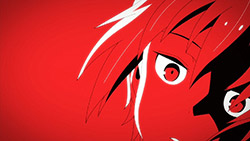 |
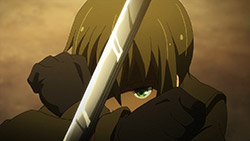 |
 |
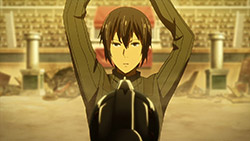 |
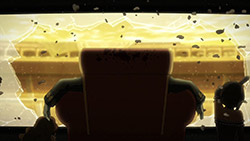 |
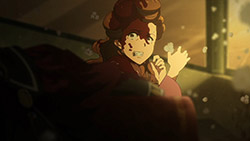 |
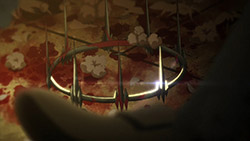 |
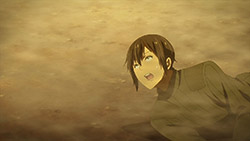 |
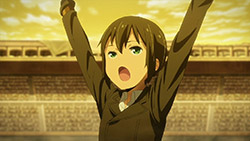 |
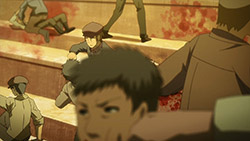 |
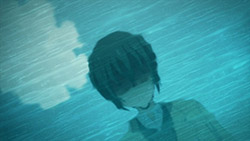 |
 |
 |
 |
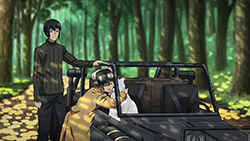 |
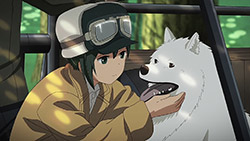 |
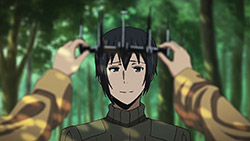 |
 |
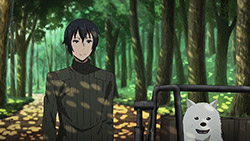 |
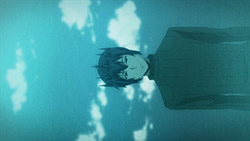 |
「コロシアム」 (Colosseum)
“Colosseum”
This week, I knew this episode would be one of the few stories that appeared in the original anime, so I wanted to see how they did it to compare and contrast. I soon learned that this would be an unfair comparison given that the 2003 anime dedicated two episodes to the Colosseum arc where Kino is trapped in a death tournament for citizenship and a new law. It’s also where it became apparent that to make this particular series more of a “Greatest Hits” compilation, there are sacrifices they have to make to condense the arcs into half hour sections. While their take on Colosseum does trim some of the fat that was on the 2003 anime’s take on the story,
Because the tournament has to go lightning-fast, there isn’t much focus on the interpersonal relationships that grow with the competitors enough so that they’re fine with surrendering to Kino. The old mechanical man with the flamethrower trumpet is reduced to a jobber that Kino takes out swiftly. That cool woman with the grenades or the mustached man are no longer present. What made a bulk of the Colosseum story interesting was how they showed Kino interacting with other characters who happened to stumble across the town and into the tournament for their own reasons, whether it be to become an upper-class elite, to reform the land through their own law, or because they never knew anything in life, but killing. We learn through Kino’s experience that these people’s lives are worth preserving, and the circumstances they fell into don’t disqualify them from being humanized. Some surrender with a smile on their face while others do it in shame, but getting to know Kino still keeps the competitors cordial with her enough to trade advice or open their mind to surrender. The town is also barely explored as we aren’t given as much explanation or first-hand experience of the hierarchy between the slave class and the ruling class in this village, or the fact that even the guards have to contend with having to be slaves that live in the impoverished part of town despite working directly for the king. These aspects aren’t present in this episode, so it feels like the human element and risk is stripped away from the episode in favor of giving what it would look like if you were to summarize the story to someone in an elevator pitch.
By reducing the arc to merely Kino’s experience with the tournament, it takes much of the storytelling that made the story’s twists and turns so effective and emotional. We’re not given a single detail about Shizu, the competitor who turned out to be the kingdom’s son, until his match with Kino. In the old anime, this was told through the competitors being called to join the king in watching his favorite puppet show, which is obviously his own tale of murdering his father and wife. You can draw the lines that Shizu is the king’s son because of his reaction to all of this. The newer anime distills the king’s story into a conversation with Hermes as she makes the bullet that will kill the king. With the puppet show and the king’s other antics like asking the women in the competition to marry him to escape death in the ring or his call to have a competitor executed because he was angry also give you incentive to have as much interest in killing the king as Kino did. He plays no role in this episode other than to sit and watch the competition, so it just seems like target practice instead of this big shocking assassination against a gigantic turd of a person. Riku, Shizu’s dog, also only spoke with Hermes instead of Hermes and Kino, but I’m unsure of whether that was supposed to happen or what that means for events later in the series if they encounter more talking animals.
There is also something underwhelming about the fights in the episode. The speediness of getting Kino from the beginning to the Shizu match is one thing, but they don’t do much with the arena to display that Kino’s skills are in sharpshooting AND agility. In the old anime, Kino is a marksmen extraordinaire who ducks, bobs, and weaves behind the large rocks scattered throughout the arena. With this anime, the arena is so scarce that it feels like the only thing Kino has to do is stand from a far distance and aim to win. There was also something awesome about Kino quickly shooting off the officers’ helmets in response to their “Little Boy” or “Little Kino” remarks as opposed to just pointing the gun at the officer.
It’s not all doom and gloom about the episode on my end though because I thought they were effective in expressing Kino’s emotions a lot more openly in this remake. Kino takes it much harder when it’s revealed that the woman on the carriage turned out to be in the tragic scenario where she had the luck to surrender against her husband when they were forced into the tournament, but the husband had the misfortune of being matched up with an opponent that didn’t accept his surrender and killed him. That was one hidden blessing about condensing the arc in that the focus on having Kino aim to kill the king is intensified when we see Kino constantly reflecting back on that woman. In addition, we see the full scene of Kino’s law as it happens with her demand for everyone to fight until someone is crowned a king. The old series positions leaves it vague enough where it’s still chaotic, but only until they are able to find a suitable king from another tournament. In this one, there’s an outright brawl in the arena as Kino gets ready to leave. Her feelings are cemented with a scene where Kino throws a large rock in frustration into the river after thinking about how the woman on the carriage looked after leaving the town. While the episode does have Kino act more aggressively than in the old series, I feel like it does add something to see that side of Kino.
Understandably, the episode isn’t able to capture some of the stronger elements of the original Colosseum story in such a small amount of time, but for those who know the arc like the back of their hand and don’t feel like putting up with the lengthier segments of it, this episode provides a reasonable enough alternative. It’s still nice to see the anime with a modern sheen to it, and it was great to see some of the old scenes given new life in the HD landscape. Still, if you have the time, give Episodes 6 and 7 of the 2003 series a view to compare and contrast.

I hate to say it, but this is a hollowed out remake episode
from the original and did not do it the justice it deserved.
In this remake, I was left with the impression that Kino’s sole
purpose for killing the king was to avenge the woman; I think that
cheapened the whole story (yeah, yeah – I know Kino “renounces”
revenge later in this episode, which makes the whole thing more
convoluted, IMHO).
Hoping the next episode will fare better…
Yeah… the original definitely had more mental, emotional, and visceral impact. Even with the horrible character designs. There’s a very superficial “bad guys are bad. Good guys are good,” theme going on here.
Yeah, what they cut out of this episode’s adaptation stripped away much of the plot points that gave you enough time with the villagers, competitors, and the kingdom to give Kino a reason to take the opportunity to assassinate him.
Looks like I have to check the original then, but I didn’t mind the pacing of this episode. If they’re going for a Brotherhood treatment with this Kino’s Journey anime, then this thing has to happen. It certainly doesn’t diminish the effect of the original, and it certainly doesn’t mean the rest of this anime will be paced the same. At the very least, Shizu isn’t given a rushed introduction IMO, and we’re sure to know more things about him in further episodes.
True, I wouldn’t hold it against this adaptation because they wanted to get through an episode that’s already been done. I remember liking the first half of the 2003 FMA better than some of the early segments of Brotherhood, but Brotherhood ended up capturing the manga perfectly by the time it made it past the material that was already adapted. I’d imagine that with the episodes outside of the ones previously from the old anime will have much more depth to them.
Ugg, this was paced like a Saturday morning cartoon for Ritalin addicts. The first episode was nice, so I hope the rest of the series doesn’t suffer from this episode’s issues. Maybe the animators felt obligated to include this story for some reason, but didn’t want to fully re-tread what the original series had done. (Kind of like the first part of Full Metal Alchemist: Brotherhood.)
Wow… this episode was awful. There was zero world building. Zero interaction with the citizens of the country. Zero depth to the reasoning behind why Kino killed the king. It was just Kino beating up random mobs and then shooting the king… followed up by the shallowest of interactions with Shizu.
I’m officially worried about this reboot now.
There was much more of this with the original episodes that I was surprised with how wonky it became once it was condensed into a single episode. They raced through this story and Shizu’s introduction in their approach to Colosseum. I think that it might just be the case with this one because it was from the original anime, and they probably felt anyone following the series knows the story enough to get the gist of it.
Considering the stories they want to tell, I think they wanted to get Shizu’s introduction out of the way. Aside from the fight and introduction, I feel that there wasn’t much regarding this country.
In defense of this reboot, this episode is a very faithful adaptation of the corresponding chapter from the light novel. Pretty much the only differences are the battle against the knife guy and the woman being cut short (and the guards’ helmets not being shot off).
The creators of the first anime took a lot of liberties with this chapter and added lots of scenes to it. In the novel Kino doesn’t interact with anyone in the country, the King has zero presence other than the moment he’s killed and, well, pretty much everything else people are “missing” from this episode just doesn’t happen as well.
Hmmm. I don’t think “very faithful adaptation of such-and-such” is an excuse for anything anymore, as clearly delineated by Sailor Moon Crystal.
Good storytelling is good. Whether it sticks close to the source material or not is irrelevant.
It is, however, an explanation that helps understand what the anime staff in Lerche are doing. Mainly, for good or bad, they’re sticking to the LNs rather than the old show. And understanding this is needed because you can’t blame staff for wanting to be faithful to the source when adapting something. And otherwise, we get ignrants ranting about them rushing stuff to fit in one episode, when they rushed nothing.
@bassgs435 Sure. But the blame isn’t gonna dissipate.
Instead of blaming the writers, we’ll just redirect the blame to the folks who made the executive decision to follow to the source too closely at the expense of superior storytelling that the 2003 version had.
Ah, that does clear up why it felt like those episodes were much longer. I do appreciate the liberties from the first anime alot more, which is why I was wondering why this version of Colosseum felt barren, but it can’t be helped if the story was original written in the LN with less detail than the old anime. Can’t hold it against them either if that’s how it was mostly written. Still, in comparison, the liberties they did take did alot to enhance how the narrative flowed.
In any case, if this was faithful or not. Until now the Animes here resolved around Death..
I am doing an Amazon thing, to picture you my thought:
If peoples like this 2 Episodes then they would also like:
– Judge Dreed (Film)
– The Punisher (Comic)
– Wild West Movies (Films)
– Payday (Game)
Where the person with the Gun is the Judge and the Executer in one Person, and always being right
But yes, in how the World is currently change with their morals, this reboot really hit the right timing…. or perhaps not?
Is this Show faithful to Deaths?
Just to clarify to everyone this reboot of Kino will adapt the most popular LN stories as voted by the fans. The Coliseum was one of them. As far as I remember the only other story voted that the 2003 series adapted was “The Country of Adults” which was Kino’s origin story. I’m hoping they do that better because I always found that episode disturbing (in a good way). Most of the stories though have not been adapted by the last series so we can look forward to newer content.
As for this episode, I didn’t like it either for reasons already stated. In hindsight it was probably doomed already because it was going to be compared to its last adaptation.
What bothers me most is that this was what was picked for the second episode which I find to be to be a poor choice for new viewers. This story should have been show later when the audience gets a better understanding Kino’s character. All it really did was to introduce Shizu for future stories and to establish the Kino combat abilities. In the case of the latter though, the 2003 series did it much better on its second episode and that was only a short fight scene of an otherwise great episode.
If I recall correctly, I’ve seen on a chart that Colosseum is a story from earlier in the light novels, so their fan-vote would aim to go in order other than the first episode. Wonder how well they’ll do some of the other stories that were from the 2003 show.
https://randomc.net/image/Kino%20no%20Tabi/Kino%20no%20Tabi%20-the%20Beautiful%20World-%20the%20Animated%20Series%20-%2002%20-%20Large%2005.jpg
In all honesty, no one can surpass the original. This was a far better adaptation than expected but even it fell inferior to the original. Still, well done…
Given the constraints that they have to work with, devoting this story to one episode rather than two, it’s clear that they had to cut some things out. This episode was rushed, and compared to the previous one, it’s hard to get a clear backstory. I think that it had to be rushed since the series will tell stories about Shizu and Master, not just Kino, so I don’t think they could devote two episodes to this. Compared to Kino’s other adventures, in terms of a story, there doesn’t seem to be much anyways in the light novel aside from just introducing Shizu and Riku. If they were going to follow the novels exactly within the story they were trying to tell, I don’t think there was much that they could do about it. Nevertheless, since we got this somewhat-mandatory episode out of the way, I look forward to new stories.
Also, I didn’t really understand the couple. She went to the country, lost her husband there, so why did she tell Kino that it was a nice place and that she should visit? At the end, was Kino frustrated at the couple for deceiving her, or was she just angry at the circumstances?
That’s true that it would’ve taken anime-original scenes to give a tournament episode anything significant to the story. If the original novel used the story as merely a means of introducing Shizu and Riku, you’d want to just focus on them instead of putting the extra effort into world-building around a tournament. The 2003 anime did it perfectly with its original scenes, but I wouldn’t fault this remake for treating the section as a way to get Shizu into the picture quickly so they can utilize him to his fullest later on.
This reminds me how in the beginning people were critical to the HxH 2011 adaptation because they kept comparing it to the 1999 anime version. Usually people hate when the studio adds anime original scenes, but I guess that doesn’t seem to be the case with this series. I for one, am pretty glad that the studio is sticking to the source material and being faithful.
I remember that. People were so upset when Killua Show Spoiler ▼
I can understand that. I’d want this adaptation to stick closer to the source even if it means episodes like this where it feels like the missing umph is from the anime-original scenes from 2003. Hopefully the future episodes won’t have to condense too much of their stories, but the first episode felt like it did a good job at sticking to the story well, so I have faith that they’ll do good on the future eps.
I love this episode. I know it’s vastly different from the two-episode story of the last, but the way the original adapted that one was already fantastic. I don’t want them to do it again. The episode showed a different side that I still love. Kino No Tabi has always been about its quietness. I don’t have a preference for which one I like better and I don’t think they should be compared at all, but should be considered as a package.
I’d love to see the reboot showed a more animated fight, but it doesn’t have to be now. I think it’s the music that’s kind of underwhelming. Kino No Tabi’s music was suspenseful during the fights.
And with the order of the episode, it makes sense for us to not see the side of Kino interacting with so many people yet. There’s still the distance between her and the audience. Hopefully, it builds with the reveal of Kino’s past – now THAT, I don’t want them to simplify.
As someone who has not watched the original, I felt like the episode had me a bit confused as to why Kino did what she did. It seems to leave things to our imagination, or at least it doesn’t try to make it clear. But while it’s annoying like an unscratched itch and leaves me wishing I had a little more insight as to what goes on in Kino’s head, I actually liked it quite a bit.
To me, this arc is about revenge, and I think the episode and how oddly/confusingly Kino handled the situation works well. The comment about revenge being silly (forgot the word they used for it) goes nicely with the fact that Kino’s purpose wasn’t anything noble and grand at all. Imo, it wasn’t anything like wanting to fix the system/correct the wrongness and make people’s lives better. Afterall, Kino seems more of a bystander than that sort of person (based on impressions so far). She just did it out of spite(not really spite but can’t think of how else to put it) and revenge at the situation. Revenge for who or what? It’s unclear now, which nags at me because it feels unresolved and we’ll never get to know, but I feel like it’s also because she didn’t do it for any specific reason. Anger at who/what? The woman for telling her to go? The system? The pitiful travelers dying? The king? Well, I don’t think it’s any particular thing alone but an odd mixture of feelings accumulating that made her want to do something like that.
I’m sure Kino believed the king deserved to die. But why throw the country into chaos after? I think she did it out of anger/spite/whatever emotion, perhaps even partially at the citizens of the country that may or may not have preferred this lifestyle, but have mostly accepted it anyway. Throw in some unconcern about a place that has her unwillingly forced to enter a fight to the death, somewhere she feels no emotional connection to, and I can see why she would do such a thing. Something along the lines of, sure, I’ll play by the rules you’ve set, now do what you will. If considering this, I’ll see how it makes sense to not flesh out the other fights – it kind of strengthens the idea that she doesn’t feel any desire to save or protect the country’s people, so she did what she did with the rules and left, leaving the citizens to decide whatever they want to do next. She doesn’t want to kill them if preferable, but I don’t think she would care very much if they decided to fight amongst themselves. And not adding more antagonist points to the king makes sense here then – he doesn’t become this person that we’ll personally come to hate and want to see dead, but remains this distant person pulling the strings behind things that we don’t agree with and can easily accept that he deserves to die. He’s the root of the evil yes, but not exactly where all the anger is directed.
I’ve not seen the original as I said, but so far most comments I’ve seen (on reddit too) seem to say the opponents were more fleshed out, had a story, and the king was more of an antagonist in the original. There just seemed to be more of a purpose overall (?). I think it just played into the narrative of evil king, personalized citizens that might not be all that bad, and Kino having a reason to want to win and kill the king. Generally, it seems that it was just more meaningful with build up and a more fleshed out reason for the decisions, which is why most prefer the original.
Personally, what I liked about this episode was exactly the fact that there doesn’t seem to be a very proper reasoning behind Kino’s actions. It feels more to me like she did it because she wanted to – for herself. Which I think is more in line with what I feel about the show so far, and the whole ambiguous revenge idea. Wanting revenge works in weird ways after all, and don’t usually make much sense.
Anyway, I believe both stories have their merits but are simply trying to tell totally different stories with the same general structure, so I feel a little sad to see that it’s getting disliked for not having certain factors that wouldn’t actually add much considering the type of story it is trying to tell this time. Sure perhaps this episode could be improved on (e.g. prince guy), but I think comparing the two adaptations that are trying to tell different stories doesn’t work so well.
Overall though, I think this shouldn’t have been the second episode. It’d be better to have been introduced to Kino a bit more first. Also – the reveal about Kino’s gender was subtle and really great – I think people would have missed it, even.
For some reason, seeing Kino’s face like that makes her look very young.
https://randomc.net/image/Kino%20no%20Tabi/Kino%20no%20Tabi%20-the%20Beautiful%20World-%20the%20Animated%20Series%20-%2002%20-%20Large%2025.jpg